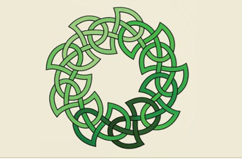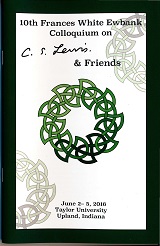Event Title
Paper Session 1-B: MacDonald and Friends
Location
Euler 108
Start Date
2-6-2016 3:30 PM
Description
"Mutuality in Wonderland: Charles Dodgson, Adopted Member of the George MacDonald Family" - Rachel E. Johnson (Presented by Sam Hammond)
Charles Dodgson had a close and long-standing friendship with the family of George MacDonald. When they first met in 1859, they already had several mutual friends and were both influenced by the thinking of F. D. Maurice. When Lewis Carrol wrote down Alice's Adventures Under Ground, the MacDonald children were the first audience to hear the manuscript read aloud. They responded enthusiastically and MacDonald encouraged Carroll not only to publish but to lengthen the narrative. This paper is written with two aims. The first is to examine how the friendship of these two very different men developed to the extent that Dodgson was absorbed into the MacDonald family as 'Uncle Dodgson'. The second is to briefly investigate the resulting cross-fertilization of ideas and experiences, which found their way into the writing of both authors, through parallels, parodies and the exploration of dawning self-knowledge as their protagonists journey towards maturity.
"Dodgson and Neuhouser: A Legacy of Logic and Faith" - Marie K. Hammond
Charles Dodgson taught mathematics at Oxford University in the second half of the 19th century. He was a good friend to the family of George MacDonald, and like MacDonald, he wrote fantasy stories for children (under the pen name Lewis Carrol). Dodgson's profession, his literary connections, and his stated Christian faith all remind us of our late friend David Neuhouser, in whose memory the colloquium is dedicated. The interests and accomplishments of David Neuhouser and Charles Dodgson spanned the seemingly unconnected fields of mathematics and literature. Both men found ways to incorporate math, science, and logic into their writings about religious topics. In focusing on Prof. Neuhouser's expository papers and Mr. Dodgson's fantasy stories (especially Sylvie and Bruno), one can see that the works of these authors help to dispel the notion that religion and science are at odds with each other.
"The (Lost) Virtues of Being a Generalist: Lessons from C. S. Lewis, Wendell Berry and David Neuhouser" - C. Christopher Smith
In a world in which professions are becoming increasingly specialized and thus fragmented from one another, the broad range of work from scholars such as C.S. Lewis and Wendell Berry reminds us that another way is possible, one that guides us deeper into the interconnected life of God's creation. In this paper, I will briefly explore both Lewis and Berry as generalists, with an appreciative emphasis on former Taylor University C.S. Lewis Center director David Neuhouser and the ways he taught and modeled a similar generalism. If we are to collaborate with God in the reconciliation of all things, then we will need generalists who have a healthy imagination for how disciplines that typically operate independently might begin to converse and collaborate for the well-being of all creation. By paying attention to generalists like Lewis, Berry and Neuhouser, and by reading broadly and attempting to connect diverse streams of thought, I maintain that the vocation of the generalist in the twenty-first century is not only possible but essential.
Event Type
Paper
Paper Session 1-B: MacDonald and Friends
Euler 108
"Mutuality in Wonderland: Charles Dodgson, Adopted Member of the George MacDonald Family" - Rachel E. Johnson (Presented by Sam Hammond)
Charles Dodgson had a close and long-standing friendship with the family of George MacDonald. When they first met in 1859, they already had several mutual friends and were both influenced by the thinking of F. D. Maurice. When Lewis Carrol wrote down Alice's Adventures Under Ground, the MacDonald children were the first audience to hear the manuscript read aloud. They responded enthusiastically and MacDonald encouraged Carroll not only to publish but to lengthen the narrative. This paper is written with two aims. The first is to examine how the friendship of these two very different men developed to the extent that Dodgson was absorbed into the MacDonald family as 'Uncle Dodgson'. The second is to briefly investigate the resulting cross-fertilization of ideas and experiences, which found their way into the writing of both authors, through parallels, parodies and the exploration of dawning self-knowledge as their protagonists journey towards maturity.
"Dodgson and Neuhouser: A Legacy of Logic and Faith" - Marie K. Hammond
Charles Dodgson taught mathematics at Oxford University in the second half of the 19th century. He was a good friend to the family of George MacDonald, and like MacDonald, he wrote fantasy stories for children (under the pen name Lewis Carrol). Dodgson's profession, his literary connections, and his stated Christian faith all remind us of our late friend David Neuhouser, in whose memory the colloquium is dedicated. The interests and accomplishments of David Neuhouser and Charles Dodgson spanned the seemingly unconnected fields of mathematics and literature. Both men found ways to incorporate math, science, and logic into their writings about religious topics. In focusing on Prof. Neuhouser's expository papers and Mr. Dodgson's fantasy stories (especially Sylvie and Bruno), one can see that the works of these authors help to dispel the notion that religion and science are at odds with each other.
"The (Lost) Virtues of Being a Generalist: Lessons from C. S. Lewis, Wendell Berry and David Neuhouser" - C. Christopher Smith
In a world in which professions are becoming increasingly specialized and thus fragmented from one another, the broad range of work from scholars such as C.S. Lewis and Wendell Berry reminds us that another way is possible, one that guides us deeper into the interconnected life of God's creation. In this paper, I will briefly explore both Lewis and Berry as generalists, with an appreciative emphasis on former Taylor University C.S. Lewis Center director David Neuhouser and the ways he taught and modeled a similar generalism. If we are to collaborate with God in the reconciliation of all things, then we will need generalists who have a healthy imagination for how disciplines that typically operate independently might begin to converse and collaborate for the well-being of all creation. By paying attention to generalists like Lewis, Berry and Neuhouser, and by reading broadly and attempting to connect diverse streams of thought, I maintain that the vocation of the generalist in the twenty-first century is not only possible but essential.


